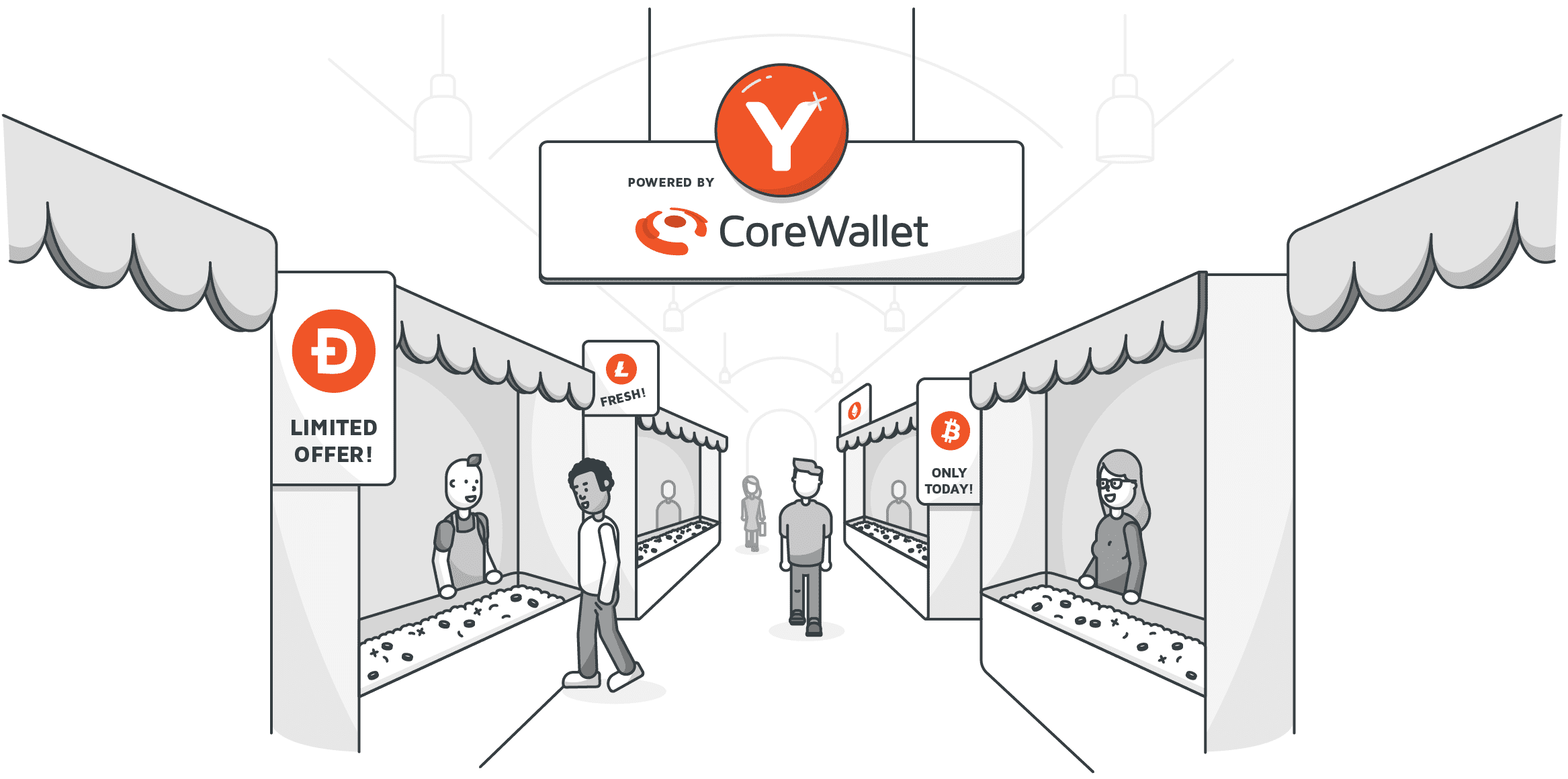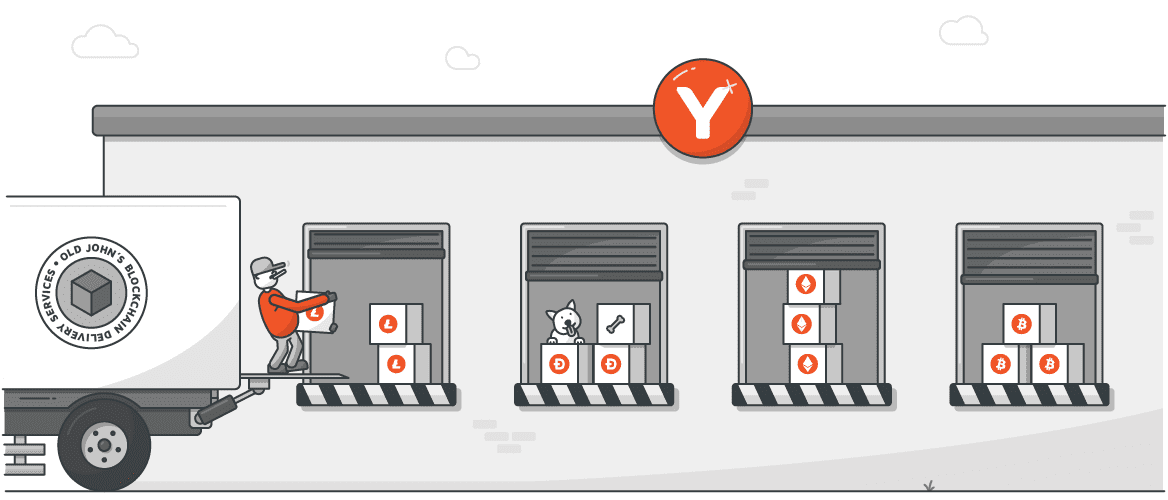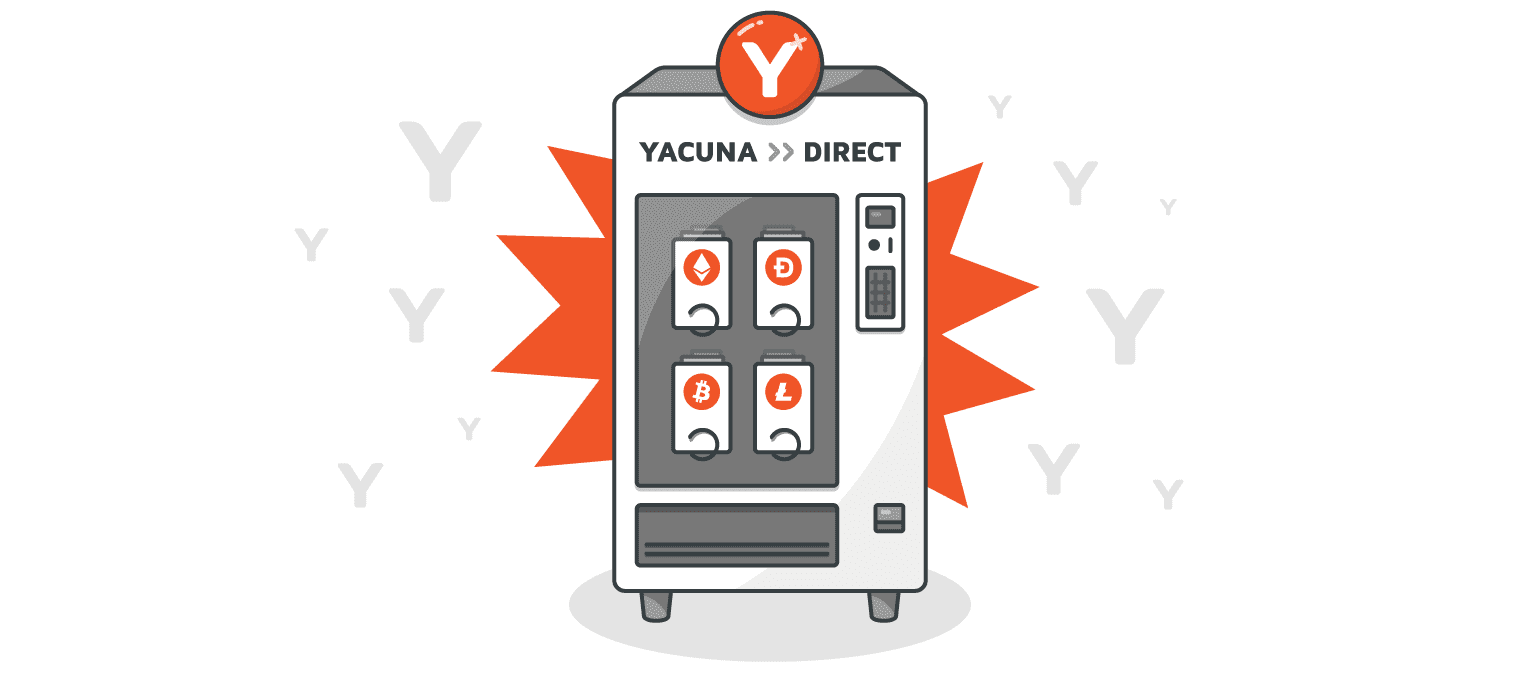Yacuna was a cryptocurrency trading platform that we built and operated as a joint venture. It allowed users to trade cryptocurrencies or buy them directly using fiat currency.
The USP: A Secure, Regulated Crypto Exchange
Cryptocurrencies have long moved on from their niche existence. But back in 2014, coins like Bitcoin, Litecoin and Dogecoin were just breaking through into the mainstream. The crypto market grew rapidly. But crypto exchange platforms were still in short supply.
Together with partners, we addressed this shortage. The goal: Create a secure, regulated crypto exchange. Relying on our domain knowledge obtained working in the banking and finance industry, we approached the matter with expertise and prudence.
Starting development in 2013, we chose to build Yacuna on top of our e-wallet framework CoreWallet.

Overcoming Regulatory Obstacles with CoreWallet
When running a crypto exchange platform, security and regulatory compliance are of primary concern. CoreWallet could be configured to fully overcome the many obstacles in these areas.
We wanted our exchange to be used in as many countries as possible. This required us to implement KYC processes for customer onboarding and verification – and exclude rogue and embargoed nations or sanctioned individuals, in adherence to e.g. anti-money laundering and counter-terrorist financing directives.
What’s more, CoreWallet inherently compiled historical payment and transaction data and this data was used to generate regular reports for audit, as demanded by the UK’s Financial Conduct Authority (FCA) in our case.
Thanks to CoreWallet’s flexibility, we could easily meet the regulatory requirements and established Yacuna as the very first regulated European crypto exchange.

Creating a Unique Feature Set
Building a crypto exchange like Yacuna presented us with many technical challenges. The flexibility of the CoreWallet framework is redounded to our advantage here. While crypto exchange features were not native to CoreWallet, we could build them on top of key functions already present in the framework. For example, CoreWallet already offered an e-wallet and an accounting module.
As the main feature, we wanted to enable users to trade their cryptocurrencies for other cryptocurrencies or for fiat money. This involved key functionalities such as:
- KYC verification (upload of personal documents which can be approved by admins)
- User accounts secured by 2-factor authentication
- User notifications via SMS, email and on the platform’s UI
- Bank account verification
- Secure handling of private keys
- Fiat payments (funding and withdrawal on Yacuna exchange, payment for buying cryptocurrencies directly on Yacuna Direct via Skrill)
- E-wallet functions for topping up, withdrawing and storing money and assets, with billing and payment matching
- Offering two kinds of vouchers which allowed value transfer within the system: Vouchers given out by Yacuna itself for marketing purposes and P2P vouchers, allowing users to gift each other money
- Frozen funds accounts to prevent funding limits violations
- 4-eyes principle for withdrawals (admin approvals for amounts that exceed a configurable limit)
- Synchronizing Yacuna with various blockchains, allowing funding and withdrawal of crypto assets to and from Yacuna
- Opening positions and making trade requests on a classic order book platform (Market orders and Limit orders)
- Configurable trading, funding and withdrawal limits and fees
- High-frequency trading support (via API)
Integrating Blockchains
To realize all those features, we had to expand on the CoreWallet base. Yacuna had to synchronize with the various blockchains every time the customer was depositing or withdrawing crypto coins, while trading and P2P transactions happened completely within Yacuna. The engine had to process large numbers of trades consistently. Even when the engine is out-of-order for one minute, the result must be the same as if it still was up.
Being highly performant and currency-agnostic, CoreWallet was all set up for the task. Yet, tying in the blockchain on the Yacuna platform presented a special challenge.
CoreWallets e-wallet and payment modules provided the foundation here. On our trading platform, we treated blockchains as PSPs and user accounts as e-wallets. That meant that Yacuna handled all currencies in the same way: As e-money. The only difference between cryptocurrencies and fiat currencies was the path they took to get into or out of our system.

Depositing Cryptocurrencies
In Yacuna, all users were assigned blockchain addresses of various chains – like Bitcoin for example. All of those addresses were controlled by Yacuna. Users could send Bitcoins or the like to those respective addresses. In return, they received e-money in their e-wallets, that they could spend again for trading on the Yacuna platform.
Depositing Fiat Money
Similarly, users could deposit fiat money on the Yacuna bank account, having it assigned as e-money on the exchange platform. This e-money could then be reserved when placing orders to buy cryptocurrencies. If the request was matched, the fiat e-money would be transferred to the seller. Purchased Bitcoins on the other hand found their way into the buyer’s Yacuna account, from where they could be paid out to a private Bitcoin wallet.
Handling Fees and Limits
Thanks to the flexible fee system, a core functionality of CoreWallet, we could easily implement trading, funding and withdrawal fees. This also allowed us to offer different groups of crypto traders different conditions. For instance, we could exempt high-frequency traders from fees entirely, as they brought traffic to the platform.
In addition, CoreWallet can specify custom limits. By that, we could restrict the amount of money and crypto-assets traders with specific KYC levels were allowed to fund, withdraw or trade on the platform. Aside from that, we could define limits per a specific time period instead of per single transaction. Thus accumulated daily, monthly or yearly limits were possible. And finally, we could also put restrictions on other actions within the Yacuna system – on login attempts, for example, making the whole system more secure against fraud.
Coin-Shopping Without Risks
In addition to a customary cryptocurrency trading platform, we also implemented a service named Yacuna Direct. It was designed as an online shop platform, where users could purchase crypto coins like any digital goods at market rates and with a small markup. By that, we created an alternative way for users to obtain cryptocurrencies without the speculative risks of regular trading.

Conclusion: Crypto Solutions in Short Time to Market
CoreWallet, while not supporting many of the aforementioned features natively, could be extended with crypto trading functionalities. We realized it within just one year of development and turned out highly performant. This enabled us to launch the Yacuna cryptocurrency exchange as early as September of 2014.